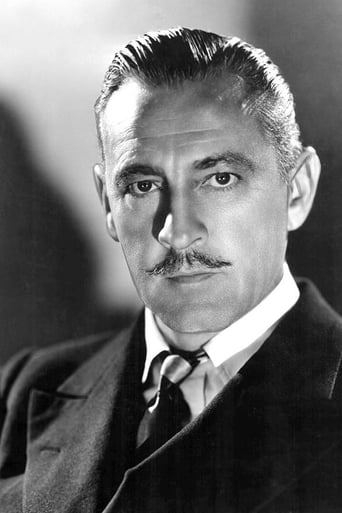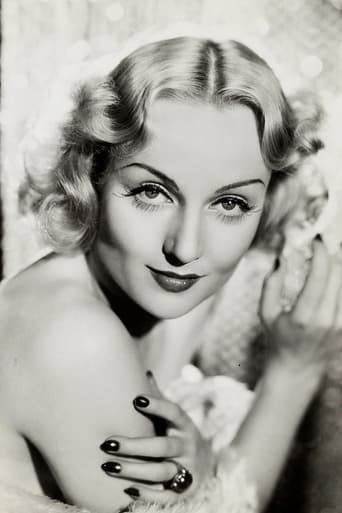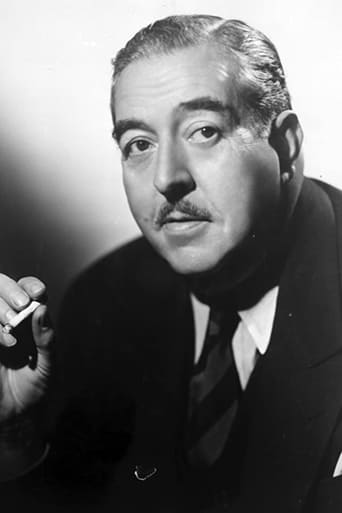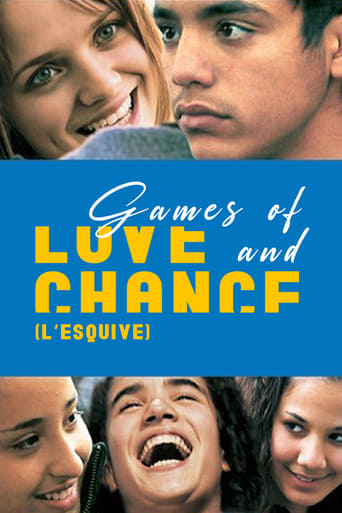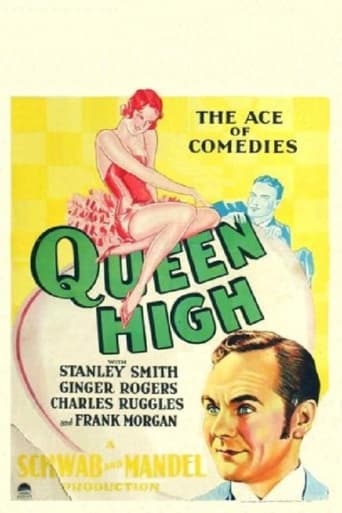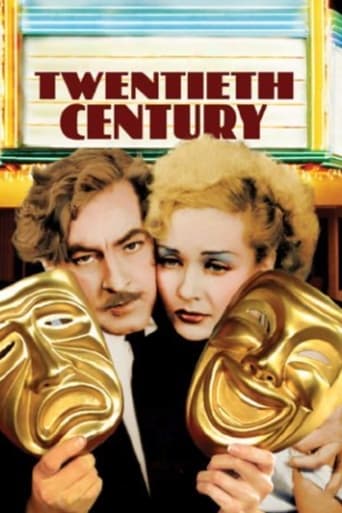
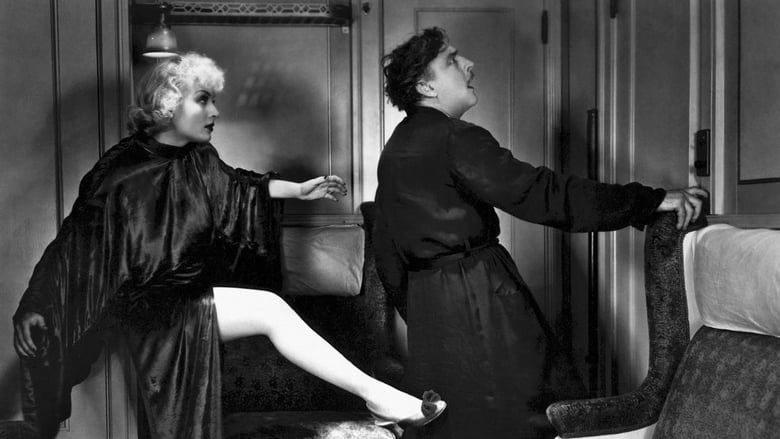
Twentieth Century (1934)
A temperamental Broadway producer trains an untutored actress, but when she becomes a star, she proves a match for him.
Watch Trailer
Cast


Similar titles
Reviews
Wow this one was a total surprise. What a fantastic treat for a quiet night of film viewing. Don't let the decade spoil you off of watching this comedy gem.Basic premise is a very talented/successful Broadway Producer finds a very untalented model turned actress. He sees something in her and decides to push her to her abilities that she doesn't know she has. He pushes and pushes and finally...she and her personality...spring to life. She becomes successful and highly praised for her performances but his grip on her is so tight...she decides she's had enough and leaves...for the dreaded...Hollywood.Fast forward a few years and many of his plays have failed miserably since she departed but a chance meeting on a New York bound train...The Twentieth Century...turns into a chance to get his career...and her...back in his life.By the end of this film you are laughing so much you forget that this was made back in 1933. Proves that old stuff can easily rival new comedies. The main point in this film is the acting performances. I can't tell you how great John Barrymore and Carole Lombard are this. He is so over the top it's hysterical. He acts his way through this like the theater trained actor that he is. Carole Lombard is so funny as the nothing turned to diva it rivals any performance she's ever done by a country mile.What you'll get in the end, if you think about it, is the characters played by Barrymore and Lombard...are one in the same. The end scene is so drop dead funny but also poetic. She fights him in the end again about how to act on the stage and when you take it into account...she's turned into him...Overly Dramatic and over the top.An absolutely wonderful film.
Popular later in the 30's because the manic pace of the comedy could make up for the lack of realism due to the imposition of the production code in mid-1934, this film is one of the rare screwball comedies made before the code began to be enforced. John Barrymore shows that besides being a great serious actor he was terrific at physical comedy as well. He even manages to comically jab at some of his own serious performances, such as when Carole Lombard calls him "Svengali", a part which he played in an earlier Warner Brothers film. Carole Lombard hasn't quite reached the peak of her powers yet though, and she comes off as overacting. I just can't figure where some of her screaming is coming from and what or who exactly it is supposed to be directed at.There is some great comic support in the person of Walter Connally whom Barrymore's Oscar Jaffe is constantly firing and rehiring. The best light touch is in the person of fellow passenger on the "Twentieth Century", Matthew Clark. He goes around the train putting up signs that say "Repent the end is at hand" and also likes writing large checks for which he has no cash reserves. He ends up figuring into the final plot twist in a big way.One odd thing that has come up in other films from the 30's that also comes up in this one is that apparently people could be arrested and jailed for bad debts. At the height of the depression, credit was very hard to come by and you would basically have to lie to get into debt and be unable to repay, thus the criminal offense. Very different from today's situation, at least, so far.
It's been years since I've seen this classic Columbia comedy from 1934. I was very familiar with the story from the Cy Coleman/Comden and Green Broadway musical and a recent Broadway revival. But a recent viewing of the film made me appreciate what a fine film this was. John Barrymore and Carole Lombard were perfect for the roles of Oscar Jaffe, eccentric Broadway Producer, and Lily Garland, his muse. Barrymore repeats the theme of Svengali here, a lot more comically. He hams it up perfectly, which is right for the role here. It wouldn't work in his later films, making him come off as sad and desperate.The basic story is producer Jaffe builds an innocent young girl into a star. As Lily Garland, she rises to the top of Broadway, but gets locked into Jaffe's possessive ways which prevents her from enjoying her stardom. She runs out on her contract after discovering that he's been interfering with her mail and tapping her phone lines. Edgar Kennedy has a good bit as the private investigator who is the victim of her wrath when she discovers what Jaffe has done. She heads to Hollywood, and Jaffe ends up with a series of flops that leaves him broke. Sneaking on the train in Chicago to avoid police hired by creditors, Barrymore and group are stunned when Lily boards the train. Also on board in Matt Clark (Etienne Girardot), a sprout of a man who puts up "repent" signs everywhere he goes and passes off bad checks.Things turn entirely screwball as all parties meet up, intermingle, and explosions occur. I couldn't help but hear Cy Coleman's score in my head in various scenes, particularly "Up against the Wall" and "Repent" (performed on Broadway by Imogene Coca as Leticia Primrose, the re-named Matt Clark). While the book of the musical is weaker than the straight play's script, it was an enjoyable time-filler that is worthy of revival.Roscoe Karns, Charles Lane, and Walter Connelly are outstanding as the people involved in Barrymore's circle; Ralph Forbes, as George Smith, Lily's new beau on the train, doesn't have a chance surrounded by this group. His role was not that strong, actually made better in the musical. The ending is fun too, quite believable in its irony, that on Broadway, sometimes nothing changes but the date.
109: Twentieth Century (1934) - released 5/3/1934, viewed 8/10/08.John Dillinger shoots his way out of an FBI ambush in Wisconsin. The Three Stooges unleash their first short, 'Woman Haters.' BIRTHS: Shirley MacLaine.DOUG: Next up is Twentieth Century, directed by Howard Hawks and based on the play by Charles Bruce Millholland. I'm a bit surprised this movie didn't receive any Oscar love. It just seems like that kind of movie. The perfectly cast John Barrymore plays Broadway director Oscar Jaffe, and gives a performance that is so over-the-top it crosses over into parody. Jaffe is always hunched over like a gargoyle, his hair is constantly a mess, his eyes frequently threaten to fly out of his head and hurt someone, his fingers are always twisted and deformed, and he speaks constantly in indulgent, operatic monologues. The film begins with his "discovery" of a young ingénue played by Carole Lombard, whom Jaffe rechristens as Lily Garland. Under Oscar's guidance, Lombard goes from promising young starlet to spoiled diva in nothing flat, and is soon jetting of to Hollywood to get away from her needy, demanding boss. Lombard couldn't possibly get by with a straightforward performance opposite Barrymore here, so instead she goes for trying to be just as big of a drama queen as him, which fits the material. Contract Player Alert: Seeing Walter Connelly and Roscoe Karns as Oscar's loyal, exasperated underlings was a pleasure (we just saw them both a few days ago in It Happened One Night). They ground the movie, so the audience can keep one toe in reality amongst all these preening lunatics. In the end, I didn't really dig the movie; all this ham acting can get tiresome after a while, and nobody really learns anything by the end.KEVIN: Howard Hawks directs a great cast and a great script, but at the end of the day, Twentieth Century just made me itch. John Barrymore ditches his usual aged dramatic persona and hams it up for the role of the self-important and egregiously over-the-top lunatic stage director Oscar Jaffe. Although it was sometimes hilarious to watch this crazed jerk do his thing, he came off as extremely one-note after a while. I laughed quite a bit, especially whenever Walter Connolly and Roscoe Karns were on screen, but most of the time I wasn't sure how seriously to take the material. This was especially tricky with Carole Lombard, who most of the time I couldn't tell if she was playing the part for laughs or if she is supposed to be a more serious foil for Barrymore. **SPOILER** I didn't find it very funny that the main characters end up right back where they started. He's an even more self-important jerk than before, and his hamminess has rubbed off on her, so now I can't imagine they'll get anything done on stage ever. **END SPOILER** Maybe I was in the wrong mood to truly enjoy this movie, but it certainly won't go down as one of my favorites for this year.Last film: Tarzan and His Mate (1934). Next film: The Thin Man (1934).


